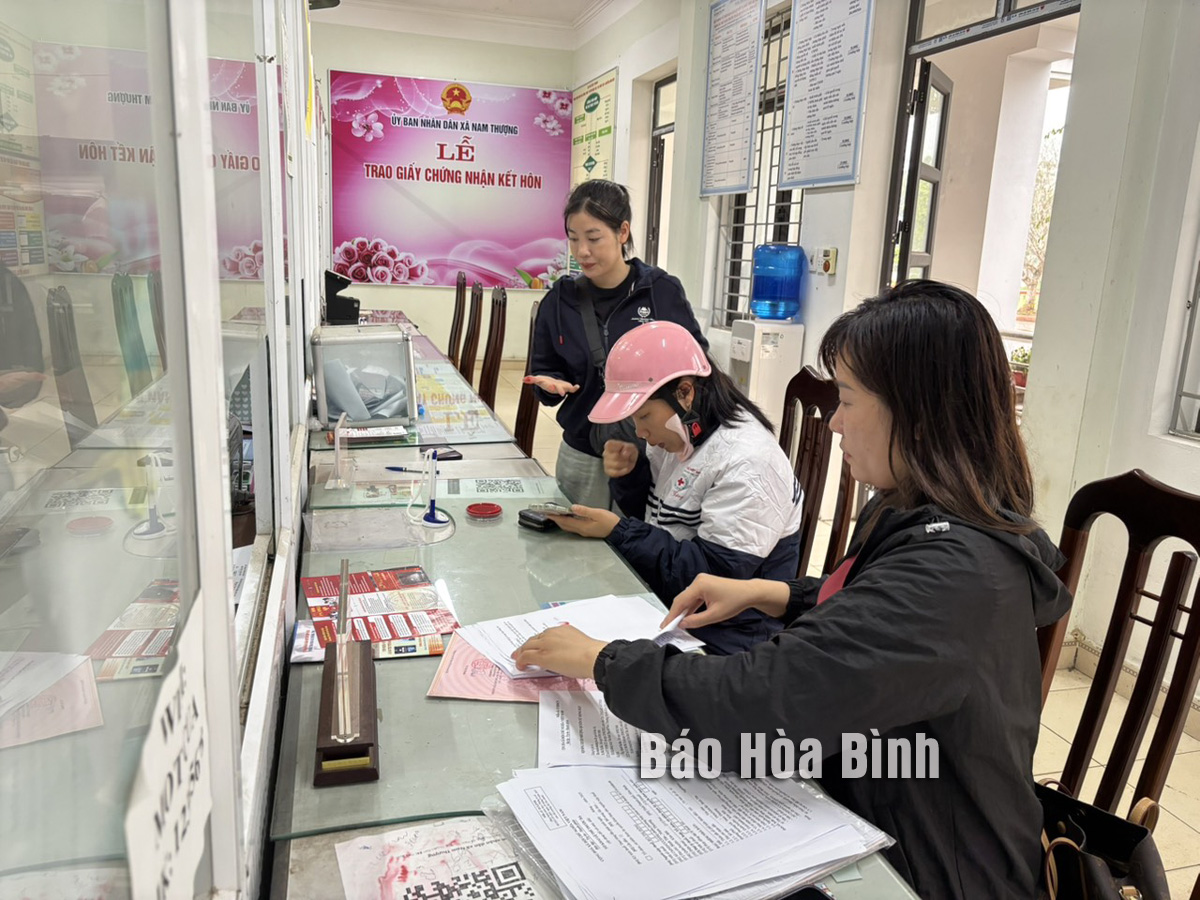
Identifying the application of online public services as a key step in administrative procedure reform and e-government building, Kim Boi district has proactively provided services and supported residents and businesses in accessing and utilising full-process online public services promptly and efficiently. The locality aims to lift the rate of end-to-end online public services to over 90%, with all officials and civil servants handling tasks in the digital environment.
100% of administrative procedure applications in Nam Thuong commune, Kim Boi
district, are now received and processed online.
Nam Thuong commune, home to over 6,000 residents
across six villages, has a mountainous terrain and a radius of over 20 km.
Local residents previously faced challenges in completing administrative
procedures due to the vast area and difficult travel conditions.
However, since becoming a model commune for
conducting digital transformation in 2021, Nam Thuong has made significant
progress in implementing administrative procedures. All administrative
procedures are now processed online, with documents handled through an
electronic data management system and digital signatures applied, facilitating
governance and operations.
Additionally, many local agricultural products
have been listed on the Postmart e-commerce platform, helping farmers expand
their market reach.
Bui Ngoc Thao, Chairman of the Nam Thuong
communal People's Committee, said that as part of digital transformation
efforts, the administration has been equipped with a data management server,
document management software, and a security camera system. Local officials and
civil servants have received training in applying information technology to
handling administrative procedures. Communal authorities also place great
emphasis on guiding and assisting locals in accessing online public services
and mastering basic digital skills.
Six community digital technology teams have been
established in six hamlets to raise public awareness of digital transformation
and give guidance in using online public services.
Quach Dinh Thi, head of Men Boi hamlet and head
of the hamlet's community digital technology team, said the team works to raise
public awareness of the significance and benefits of digital transformation,
especially the installation of the VNeID app and the usage of the online public
service portal. As a result, 100% of residents in the hamlet have installed
VNeID and know how to access their personal accounts on the online public
service portal.
In addition, technology infrastructure has been
upgraded, ensuring that 100% of administrative procedure documents in Nam
Thuong are received and processed entirely online. By the end of 2024, the
commune met all the criteria ofan advanced new-style rural area.
Currently, all communes and towns in Kim Boi
district have set up modern "single-window" divisions connected to a
specialised data transmission network.
However, as many communes are located in remote
and disadvantaged areas, numerous challenges remain on the path to promoting end-to-end online public services.
Chief of the Office of the Kim Boi district
People's Committee Nguyen Xuan Truong stated that amid the strong impact of the
Fourth Industrial Revolution, the application of information technology in
processing administrative work is a key and irreversible task.
The district has been vigorously implementing a
state-level comprehensive administrative reform program for the 2021–2030
period, and a district-level administrative reform plan for 2021–2025, aiming
to ensure that by June 2025, all officials and civil servants will fulfill
tasks on the digital environment with better services delivered to people and
businesses, he added.
The Standing Board of the Hoa Binh provincial Party Committee met on March 18 to review and guide major investment projects aimed at boosting local socio-economic development.
The air is thick with the hum of drills and the clatter of machinery as the Hoa Binh – Moc Chau expressway takes shape amid the rugged terrain. Welding sparks illuminate the faces of workers, and concrete mixers churn relentlessly, laying fresh pavement on the newly-carved road. The construction site buzzes with a palpable sense of urgency, particularly in Hoa Binh province where the expressway's future is being forged.
The northern province of Hoa Binh, with over 467,000 hectares of natural forest and more than 100,000 hectares of production forest, holds significant potential for carbon credit market development.
Replacing substandard houses with more sturdy ones by June 30 is the direction given by Nguyen Phi Long, alternate member of the Party Central Committee and Secretary of the Hoa Binh provincial Party Committee, at a meeting held in early March by the provincial Steering Committee for the programme to eliminate temporary and dilapidated houses for the needy.
Recognising digital transformation as an inevitable trend, authorities and agencies in Hoa Binh have made great efforts in the work by focusing on three core pillars - digital government, digital society, and digital economy, resulting in enhanced competitiveness, improved investment climate, and ensured economic and social welfare.
In recent years, Da Bac district has improved administrative reform with a one-stop shop mechanism, streamlined inter-agency procedures, and a shift to digital platforms. These efforts have enhanced public service efficiency and contributed to local socio-economic development.



